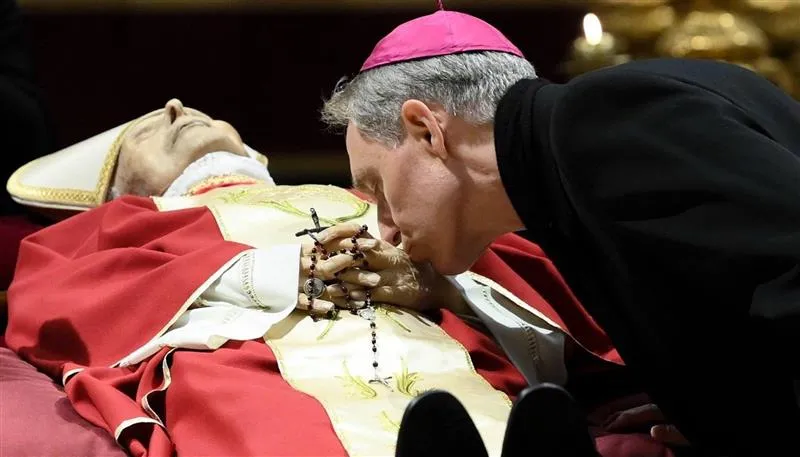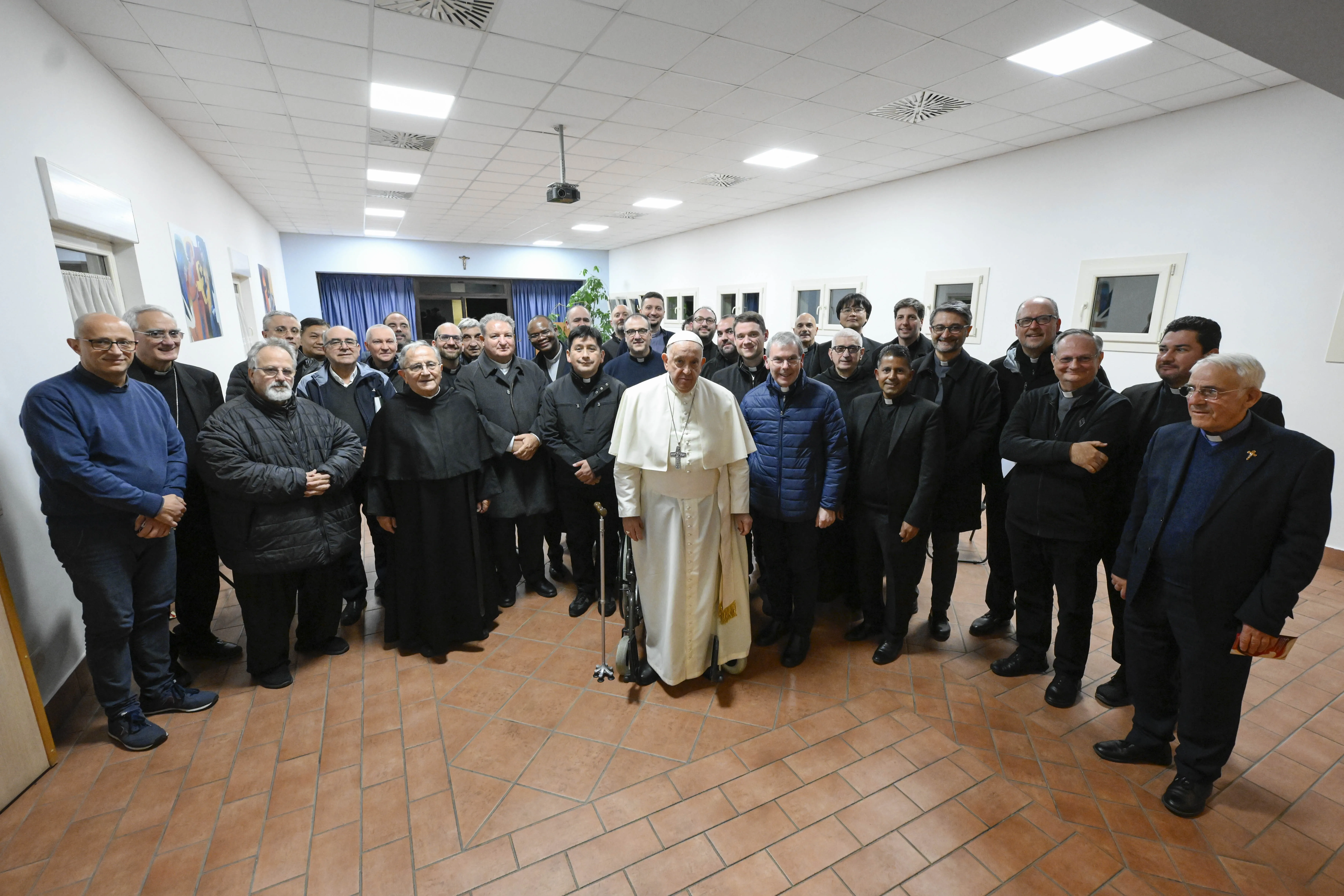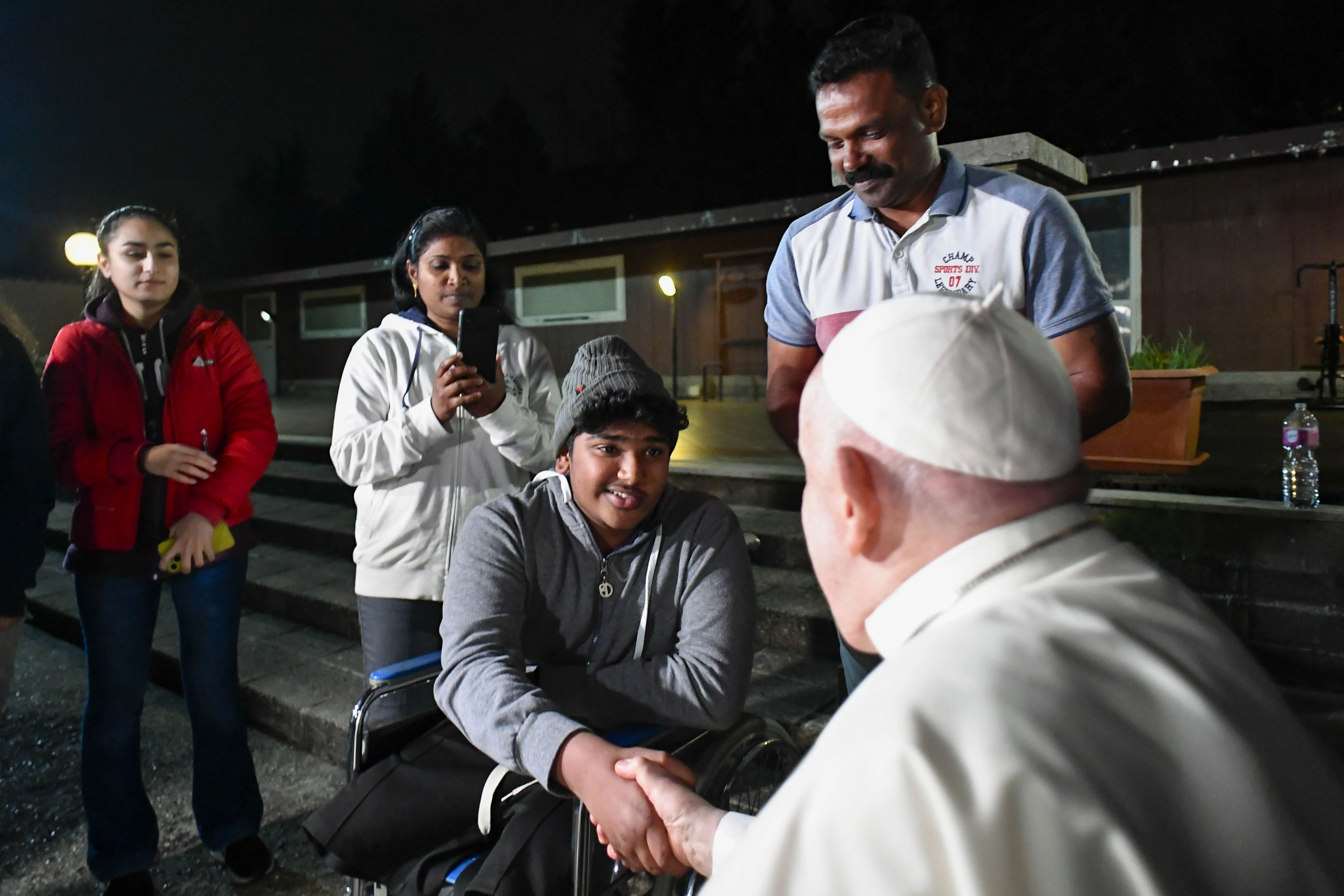
Vatican City, Jan 3, 2023 / 11:00 am (CNA).
As Pope Emeritus Benedict XVI’s personal secretary, Archbishop Georg Gänswein became a well-known presence in the Catholic world, especially since Benedict’s resignation in 2013.
The 65-year-old German not only spoke on Benedict’s behalf frequently but also staunchly defended him from criticism on numerous occasions, as he did most recently in an exclusive interview with EWTN detailing Benedict’s response to a German law firm’s report on the Church’s handling of sexual abuse cases in the Archdiocese of Munich and Freising.
Now, Gänswein has written a book detailing his life with the former pope: “Nothing but the Truth: My Life Beside Pope Benedict XVI.”
Set to be published this month in Italian, the book promises to give a firsthand account of the pontificate of Benedict XVI.
“These pages contain a personal testimony of the greatness of a meek man, a fine scholar, a cardinal, and a pope who made the history of our time. But they are also a firsthand account that seeks to shed light on some misunderstood aspects of his pontificate and to describe the real ‘Vatican world’ from within,” Gänswein said, according to the Italian press release obtained and translated by CNA.
Gänswein worked with Italian journalist Saverio Gaeta, a noted Vaticanista who has written several books about St. John Paul II and the transition from John Paul to Benedict XVI, to tell the story of Benedict’s pontificate.
According to the editorial’s press release, “Today, after the death of the pope emeritus, the time has come for the current prefect of the papal household to tell his own truth about the sinister slanders and obscure maneuvers that have tried in vain to cast shadows on the magisterium and the actions of the German pontiff, and thus, finally, to make known the true face of one of the greatest protagonists of recent decades, too often unjustly denigrated by critics as the ‘Panzerkardinal’ or ‘God’s Rottweiler.’”
“Gänswein proposes the authoritative reconstruction of a very particular period for the Catholic Church, also addressing questions about enigmatic events, such as the ‘Vatileaks’ dossier and the mysteries of the Orlandi case, the pedophilia scandal, and the relationship between the pope emeritus and his successor Francis,” the press release continued.
A native of the Black Forest region of Germany, Gänswein was born in 1956 and ordained a priest for the Archdiocese of Freiburg im Breisgau in 1984. He is a doctor of canon law, having earned his degree in 1993.
Gänswein told Vatican Magazine in December 2021 that he decided to become a priest as a result of his curiosity about the meaning of life and his efforts to find answers to life’s biggest questions through study.
“It became more and more clear to me that it’s not just about finding answers, but that it must also become my life’s work. Little by little I recognized God’s plan and discovered my vocation. After completing my studies at the university, it was clear to me: The priesthood is your way and with God’s help you will get through it,” he said in 2021.
In 1995, after serving as a judge of the diocesan tribunal and as a personal collaborator of the archbishop, he left Germany for Rome, serving first at the Congregation for Divine Worship and later at the Congregation for the Doctrine of the Faith. In 2003, he became personal secretary to Cardinal Joseph Ratzinger, who would be elected pope in 2005.
Pope Benedict appointed Gänswein as prefect of the Papal Household in 2012. In that role, Gänswein was responsible for, among other things, supervising the clerics and laypeople who assist the pope in his various duties, as well as arranging all public and private audiences with the pope.
At the same time, Gänswein was ordained as the titular archbishop of Urbs Salvia, an ancient Roman city in the Marche region of Italy, and consecrated in January 2013.
When Benedict XVI decided to resign from the papacy in February 2013, “I actually had to let my tears run free,” Gänswein told EWTN three years later.
“It really wasn’t easy for him. But he knew that the universal world Church can no longer be guided from the seclusion of the papal chambers,” Gänswein wrote in a 2017 book foreword.
Benedict XVI died Saturday, Dec. 31, 2022, at the age of 95.
Gänswein’s book is set to be the first memoir of the pope published after his death. The book will also be published in German, and there is as of yet no news regarding an English edition.
If you value the news and views Catholic World Report provides, please consider donating to support our efforts. Your contribution will help us continue to make CWR available to all readers worldwide for free, without a subscription. Thank you for your generosity!
Click here for more information on donating to CWR. Click here to sign up for our newsletter.







Archbishop Gänswein was perceived poorly, a victim of the Benedict resignation, dissatisfaction with the new pontiff, expectation of rebuttal. Bizarre allegations one that compared the Archbishop to the Pope emeritus’ jailer. That discredit was made by Archbishop Carlo Maria Viganò following his confrontation with Pope Francis over the McCarrick dossier. Gänswein refused Viganò’s request for a tete a tete with Benedict.
Archbishop Gänswein was surely aware of the outcome of such a visit with Pope Francis and Catholics worldwide. It wouldn’t appear Benedict would have approved of a visit likely intended to gain his support, and the expected dramatic repercussions at the Vatican and worldwide. That wasn’t Benedict’s style of churchmanship. Gänswein took the heat.
Whatever was thought of him, the insulting remarks etc he stood by the person he loved [a poignant indication, the photo of a pained Gänswein kissing deceased Benedict’s hand] and determined to protect.
A hard act to follow fit well with Card Ratzinger then 78 as successor to the charismatic giant John Paul who assumed the papacy at 58. Bookish theologian, long CDF prefect he seemed to some of us out of place. Gänswein says “he knew that the universal world Church can no longer be guided from the seclusion of the papal chambers”. Age was an issue at 85, and it seems his lifestyle.
Although that measure, in context of John Paul, is narrow. What he did bring us was stability, theological genius, doctrinal integrity, and a wonderful, kind humility.